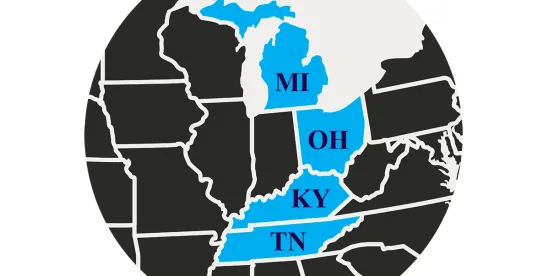The Sixth Circuit recently affirmed a professional liability insurer’s denial of coverage based on an assembly-line equipment designer and manufacturer’s prior knowledge of a customer dispute that predated the policy’s effective date. The decision, Fives ST Corp., v. Allied World Surplus Lines Ins. Co., No. 24-1921, 2025 WL 1639637 (6th Cir. June 10, 2025), highlights the importance of adequate disclosures during policy underwriting and common missteps based on alleged prior knowledge of claims or alleged wrongdoing that can lead to denials and coverage disputes months or years later when those disputes escalate into formal litigation.
Background
Fives ST Corporation was consistently late in delivering equipment to a customer. In 2020, the customer made a demand for liquidated damages, which eventually led to the parties settling for €100,000 and an agreement for FST to provide on-site services.
The negotiated resolution did not last long. In 2021, the customer sent another letter alleging that FST’s ongoing design failures had required the customer to bear substantial costs. FST disagreed, but a specialist retained by FST had already concluded that FST’s equipment was defective, which was causing it to malfunction.
In the midst of the customer quarrel, FST applied for a new professional liability insurance policy, which would cover FST’s provision of services to customers like the design and construction of assembly lines already at issue in the dispute.
The insurance application used to underwrite the policy asked if any officers or employees at FST had “knowledge of any act, error or omission, unresolved job dispute (including fee disputes), accident or any other circumstance that is or could be the basis for a claim” under the proposed policy. The application form also stated that “if such knowledge or information exists, any claim arising therefrom is excluded from this insurance.” FST had originally left this question blank, but when pressed by the underwriters, FST responded “no.”
The insurer eventually issued the policy, agreeing to indemnify FST for any “Claim” “arising out of a Wrongful Act in the rendering or failure to render Professional Services,” which was defined to include services performed for others in FST’s capacity as a construction manager. Concurrently, FST’s customer dispute continued to escalate, leading the customer to file a lawsuit alleging that FST breached its contractual obligations in “mis-designing the equipment, failing to own up to its own failure, and continuously stringing [the customer] along with missed deadlines, false promises, and partial fixes.”
After the insurer denied FST’s claim, FST sued seeking defense and indemnification under its professional liability policy. The district court upheld the denial, finding that FST knew about circumstances that could give rise to a claim under the policy and failed to disclose that on the application.
The Court’s Analysis
The Sixth Circuit affirmed the no-coverage ruling on appeal, focusing principally on one fact: FST had knowledge of its dispute with the customer when it applied for the policy and inaccurately responded “no” to the question in the application asking about FST’s knowledge of any act, error, or omission that could give rise to a claim under the policy.
The Sixth Circuit began by asking “Did FST have knowledge of its ongoing dispute with its customer when it applied for the Allied World policy?” Applying Michigan law, the court concluded the answer was yes.
The policy required two conditions to get coverage. First, the claimant’s alleged “wrongful acts” had to have taken place during the covered period of December 29, 2003, and December 31, 2022. And second, more importantly, FST’s officers and employees could not have any knowledge of those “wrongful acts” or circumstance that could give rise to a claim under the policy. When FST applied for the policy, it claimed no knowledge of disputes related to its professional services, despite being aware of potential design-defect claims from the customer assembly line for over a year prior. While the parties were negotiating a settlement, the customer continued to find defects with FST’s equipment and emailed FST a list of issues it had with the equipment FST had provided. These design and assembly issues, the court concluded, “fell at the heart of FST’s role” as a construction manager. At the time it applied for coverage, therefore, FST knew about acts, errors, or omissions, or unresolved job disputes that could be the basis for a claim.
FST argued that the dispute was simply “run-of-the-mill business and contractual disputes around the timing of delivery.” Not so, the Sixth Circuit reasoned, because FST itself recognized that the dispute centered around a “design issue,” which FST knew about when it applied for coverage.
The court also rejected FST’s argument that the alleged design defects were about a component part designed by one of FST’s subcontractors. That defense failed because FST, not its subcontractor, was contractually responsible for supplying the relevant equipment to the customer.
FST finally contended that insurers usually are not allowed to deny coverage just because the policy took effect after the circumstances giving rise to the claims. The court acknowledged that principle under Michigan law but found it inapposite to FST’s customer dispute because FST’s knowledge of the ongoing or potential claims meant that there was no coverage at all.
“Prior Knowledge” Issues and Ways to Avoid Them
Liability policies written on a “claims made” basis are designed to respond to claims asserted after the policy’s effective date, even if the alleged wrongdoing took place prior to the effective date. But insurers are wary of insuring “known risks,” which can arise in numerous ways.
Like the questionnaire in the FST dispute, one way insurers identify those risks is through application questions, asking the applicant to disclose knowledge of past disputes, demands, claims, and other grounds that may give rise to a potential claim under the anticipated policy. Another way is through the policy itself, which may include exclusions or other limitations aimed at preventing an insured from purchasing a policy for risks it knew about before applying for coverage.
The Fives ST coverage litigation highlights several key takeaways for policyholders looking to avoid similar prior-knowledge issues arising from either the underwriting process or problematic policy language.
Pay Close Attention to Underwriting Disclosures. Policyholders must remain vigilant in completing applications and fielding underwriter inquiries to avoid potential gaps in coverage, coverage denials, or policy rescission.
Misrepresentations or omissions on applications can lead to coverage denials or policy rescission. As shown in the Fives ST lawsuit, small details (or omissions) in policy applications and other disclosures to underwriters can be the difference between recovery and denial. Beyond applications, policyholders could run afoul of prior knowledge issues in other ways, like signing warranty letters (to obtain higher limits) or even making offhand statements to underwriters on phone calls or in emails. The bottom line is that these disclosures are more than a procedural hurdle to clear before obtaining insurance coverage—the facts and information disclosed in underwriting can later bar coverage—or worse, lead to rescinded policies—if the information is later deemed incomplete or inaccurate.
Beware of Prior Knowledge Exclusions. FST learned the hard way that incomplete or inaccurate representations during the underwriting process can limit or eliminate coverage for future exposures. But that is not the only way prior knowledge impacts claims. Liability carriers often include “prior knowledge” exclusions that can bar coverage if prior to policy inception the insured had a reasonable basis to believe that the wrongful acts at issue could result in a claim.
As with most exclusions, prior knowledge clauses vary widely and are subject to negotiation and, if needed, modification. Whose knowledge is relevant? What knowledge is required to trigger the exclusion and how, if at all, is that requirement qualified? Asking these and other questions in reviewing policy proposals can help identify overbreadth and avoid surprises when submitting claims.
Consider Retroactive Dates. A corollary to the prior knowledge exclusion is the policy’s so-called “retroactive” date. A retroactive date in many claims-made policies is a provision eliminating coverage for claims for wrongful acts taking place before a specific date, even if the claim is first made against the insured during the policy period. Some policies provide “full” prior acts coverage, without a retroactive date.
As you can imagine, the difference in coverage between a policy with a recent retroactive date and full-prior-acts coverage is stark. While extensions to cover all prior acts may not be possible in all cases, understanding these distinctions at the time of policy placement is important to avoid mismatched expectations when a claim arises.
Reporting and Understanding Different Types of “Claims.” Another feature of modern claims-made policies is that coverage is triggered based on when a claim is first made against the insured and reported to the insurer. This is very different from other coverages—like commercial general liability policies—that allow for reporting months or years after a policy expires, so long as the underlying occurrence (e.g., injury, accident) happened during the policy period.
For those reasons, providing notice early and often is paramount. That includes reporting both actual and potential claims (referred to as “notice of circumstances”) consistent with policy requirements. Those notice obligations turn on whether a “Claim” is made against an insured, regardless of whether the claim is frivolous, will be dismissed, or will pose a material exposure to the company or the liability insurer.
To assess whether and how to report claims, one must first understand what constitutes a “Claim” in the first place. Many sophisticated companies and executives are surprised to learn about how broadly-defined that term is in many claims-made policies, including that seemingly routine emails and other written communications from customers, investors, and other putative claims can arise to the level of a claim that triggers a reporting obligation. And that’s not even accounting for lesser-known but equally important coverage extensions for things like “pre-claim inquiries” and other matters.
In short, arming in-house counsel, risk managers, executives, and other key decision makers with adequate knowledge of how policies operate and how the company needs to respond to claims can help avoid late notice and the coverage denials that come with it.
Conclusion
Insurers will not hesitate to investigate all potentially viable defenses to coverage—including rescission—based on the policyholder’s prior knowledge of facts or circumstances giving rise to a claim submitted under a liability policy. The Fives ST opinion illustrates that coverage missteps can occur long before a claim arises and that the time to assess disclosure obligations and exclusions that might foreclose coverage based on prior knowledge is before the policy is procured or renewed. Engaging experienced brokers, consultants, coverage counsel, and other risk professionals before a claim or dispute arises can help mitigate the risk of a coverage dispute and to maximize recovery in the event of a claim.





 />i
/>i
